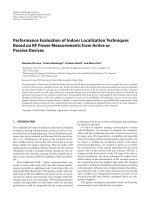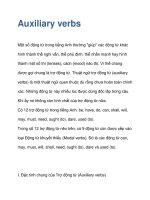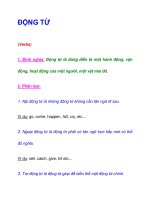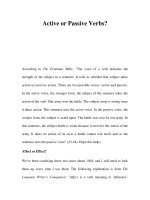Active or Passive Verbs? pptx
Bạn đang xem bản rút gọn của tài liệu. Xem và tải ngay bản đầy đủ của tài liệu tại đây (12.12 KB, 3 trang )
Active or Passive Verbs?
According to The Grammar Bible, "The voice of a verb indicates the
strength of the subject in a sentence. It tells us whether that subject takes
action or receives action. There are two possible voices: active and passive.
In the active voice, the stronger form, the subject of the sentence takes the
action of the verb. Our army won the battle. The subject army is strong since
it takes action. This sentence uses the active voice. In the passive voice, the
weaker form, the subject is acted upon. The battle was won by our army. In
this sentence, the subject battle is weak because it receives the action of the
army. It takes no action of its own a battle cannot win itself and so the
sentence uses the passive voice" (43-44). Hope this helps.
Affect or Effect?
We've been confusing these two since about 1494, and I still need to look
them up every time I use them. The following explanation is from The
Longman Writer's Companion: "Affect is a verb meaning to 'influence.'
Effect is a noun meaning 'a result.' More rarely, effect is a verb meaning 'to
cause something to happen.' Examples: CFCs may affect the deterioration of
the ozone layer. The effect of that deterioration on global warming is
uncertain. Lawmakers need to effect changes in public attitudes toward our
environment" (424).
All Ready or Already?
All ready means "fully prepared." Example: "The scouts were all ready for
the test." Already means "previously." Example: "The children were
already in the pool when the guests arrived."
Allusion or illusion?
"Allusion means reference: 'He made an allusion to last week's meeting.'
Illusion is an unreality: 'That a pair of railroad tracks seem to meet in the
distance is an optical illusion'" (Parle Craig, Ruth, Vincent Hopper. 1001
Pitfalls in English Grammar 70).
Among or amongst?
Both are correct and mean the same, but among is more common.
Among or between?
"Between is used in connection with two persons or things: 'He divided the
money between his two children.' Among is used for more than two: 'He
divided the money among his three children.' EXCEPTIONS: If more than
two are involved in a united situation, between is used: 'Between the four of
us, we raised a thousand dollars.' If a comparison or an opposition is
involved, between is used: 'There was great rivalry between the three
colleges. It was difficult to choose between them.'" (Parle-Craig, Ruth, and
Vincent Hooper. Barron's 1001 Pitfalls in English Grammar 70)
Amount or Number?
Amount should be used to refer to quantities that cannot be counted or
cannot be expressed in terms of a single number. Example: "Repairing the
Edsel took a great amount of work." Number is used for quantities that can
be counted. Example: "A large number of deer ate the corn."
And or but to begin a sentence?
Patricia O'Conner, author of Woe Is I, says, "It's been common practice to
begin sentences with them (and & but) since at least as far back as the tenth
century. But don't overdo it, or your writing will sound monotonous" (185).









